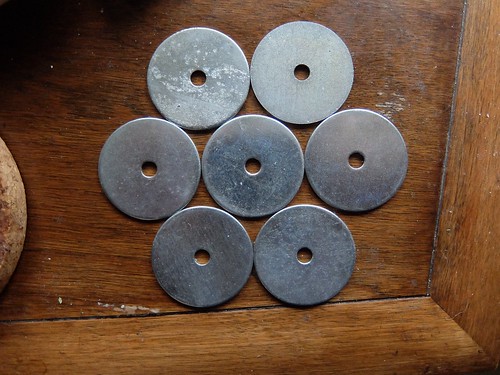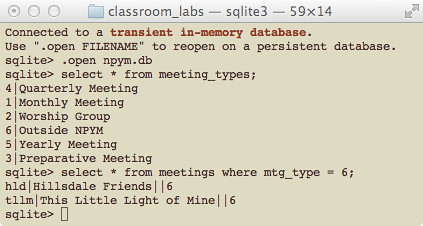I was mentioning in an internal memo today, regarding Quaker business, that because our high schools failed to pick up on SQL use as a basic literacy, we're now facing a shortage of clerking skills, recording clerk especially.
We've returned to the days when it seems only an elite minority get to commit records to tables, as instead of ledgers, or even spreadsheets, we now use SQL databases as a matter of course. But most people never get their money's worth as taxpayers. Their tax-funded schools let them down.
Fortunately for the world SQLite is free and pretty easy to use. Forget about multi-user access on a complicated web server; an SQLite database is just a text file, yet provides a fully functional SQL API. The day may soon come when our NPYM meetings swap .db files around like we share .xls (Excel) and .doc (Word) files today.
What else don't we teach in school? American History has fallen by the wayside. Civics is pretty much gone. That's the impression I get anyway, though I understand many students plow into these topics anyway, as learning may begin when they finally get home and have a chance to access the greatest library ever made: the Internet. Or maybe not. Not everyone enjoys such privilege.
I've been suggesting we open a second numeracy track, parallel to Delta Calculus, and put SQL, along with more boolean algebra, sets, data structures, algorithms, other discrete math topics (number bases, more with primes), on this newer Lambda Calculus track. Get the lexical (programs) to drive the graphical (e.g. rotating polyhedrons). Connect those left and right hemispheres in a more integrated imagination.
I've done a fair amount of pilot testing in the decades since the 1990s, and before. I've been interested in pioneering new curriculum ideas under the guise of my Oregon Curriculum Network (OCN). Then came Digital Mathematics on Wikieducator, in combination with "Martian Math", greatly influenced by Synergetics (more a vehicle for introducing some of its core concepts).
Saturday Academy let me field test with teenagers. I even got to try out some lesson plans in Bhutan and Lesotho, thanks to my school teaching mother.
What's Synergetics again? Again, American History has somewhat fallen by the wayside, or this would be more of a rhetorical question. Many high schoolers honestly don't know, because no one saw fit to connect the dots for them. Constructivism maybe means "connect your own damn dots" -- but doesn't teacher experience count for anything?
We've returned to the days when it seems only an elite minority get to commit records to tables, as instead of ledgers, or even spreadsheets, we now use SQL databases as a matter of course. But most people never get their money's worth as taxpayers. Their tax-funded schools let them down.
Fortunately for the world SQLite is free and pretty easy to use. Forget about multi-user access on a complicated web server; an SQLite database is just a text file, yet provides a fully functional SQL API. The day may soon come when our NPYM meetings swap .db files around like we share .xls (Excel) and .doc (Word) files today.
What else don't we teach in school? American History has fallen by the wayside. Civics is pretty much gone. That's the impression I get anyway, though I understand many students plow into these topics anyway, as learning may begin when they finally get home and have a chance to access the greatest library ever made: the Internet. Or maybe not. Not everyone enjoys such privilege.
I've been suggesting we open a second numeracy track, parallel to Delta Calculus, and put SQL, along with more boolean algebra, sets, data structures, algorithms, other discrete math topics (number bases, more with primes), on this newer Lambda Calculus track. Get the lexical (programs) to drive the graphical (e.g. rotating polyhedrons). Connect those left and right hemispheres in a more integrated imagination.
I've done a fair amount of pilot testing in the decades since the 1990s, and before. I've been interested in pioneering new curriculum ideas under the guise of my Oregon Curriculum Network (OCN). Then came Digital Mathematics on Wikieducator, in combination with "Martian Math", greatly influenced by Synergetics (more a vehicle for introducing some of its core concepts).
Saturday Academy let me field test with teenagers. I even got to try out some lesson plans in Bhutan and Lesotho, thanks to my school teaching mother.
What's Synergetics again? Again, American History has somewhat fallen by the wayside, or this would be more of a rhetorical question. Many high schoolers honestly don't know, because no one saw fit to connect the dots for them. Constructivism maybe means "connect your own damn dots" -- but doesn't teacher experience count for anything?


